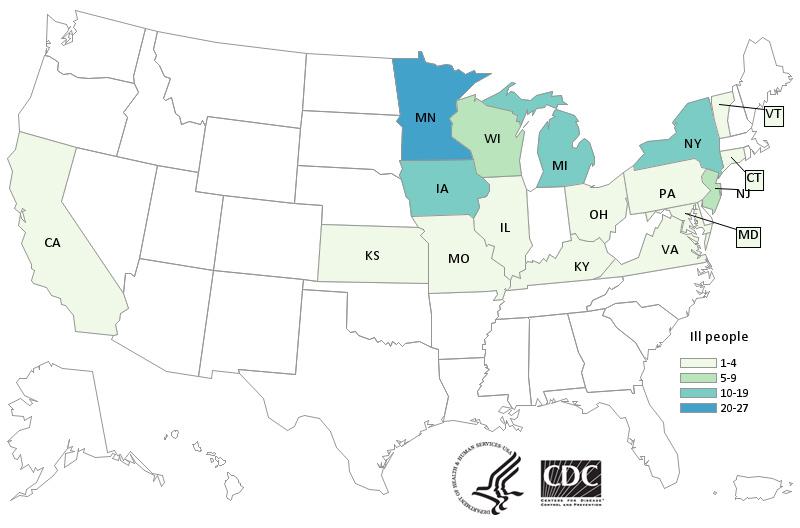As of October 16, 2020, there have been 101 confirmed cases of Salmonella Enteritidis linked to the recent Prima Wawona peach recall. The CDC has reported cases in 17 states: California (1), Connecticut (1), Iowa (11), Kansas (10), Kentucky (1), Maryland (1), Michigan (18), Minnesota, (27), Missouri (2), New Jersey (8), New York (14), Ohio (1), Pennsylvania (4), Vermont (1), Virginia (3) and Wisconsin (6).
People infected with the outbreak strain of Salmonella Enteritidis by state of residence, as of October 14, 2020 (n=101)

Individuals became sick between June 29,2020 and August 27, 2020. Twenty eight individuals were hospitalized. No deaths have been reported. Individuals who became ill were between 1 and 92 years of age, with the median age being 43. The majority of cases (64%) were female.
In Canada total, there were 57 confirmed cases of Salmonella Enteritidis illness linked to this outbreak in two provinces: Ontario (41) and Quebec (16). Individuals became sick between June and August 2020. Twelve individuals were hospitalized. No deaths were reported. Individuals who became ill were between 0 and 91 years of age. The majority of cases (60%) were female.
Whole genome sequencing analysis showed that an outbreak of Salmonella Enteritidis infections in Canada was related genetically to this outbreak in the United States. This means that people in both outbreaks were likely to share a common source of infection.
After collecting records from several grocery stores where the ill reported buying peaches, the FDA and regulatory officials determined that Wawona Packing Company, LLC, had distributed both loose and packaged peaches.
On August 22, 2002, Prima Wawona recalled bagged and bulk, or loose, peaches that they had supplied to stores nationwide. Please refer to the recalled list on the FDA's site. Recalled products are beyond their shelf life and should not longer be in stores.

As of October 16, 2020, this outbreak appears to be over.
Symptoms of Salmonella infection include diarrhea, abdominal pain and fever. Symptoms usually begin within 12 to 96 hours after exposure, but they can begin up to two weeks after exposure. Infections usually clear in five to seven days, but about 28% of laboratory-confirmed cases require hospitalization. Many Salmonella infections in otherwise healthy people do not require medical treatment. More serious infections occasionally occur. For those who seek health care, most do not require antibiotics. However, antibiotic treatment may be warranted in some cases. If you’ve consumed these products, become ill and are concerned about your health, consult your health care provider.
Salmonella: Marler Clark, The Food Safety Law Firm, is the nation’s leading law firm representing victims of Salmonella outbreaks. The Salmonella lawyers of Marler Clark have represented thousands of victims of Salmonella and other foodborne illness outbreaks and have recovered over $750 million for clients. Marler Clark is the only law firm in the nation with a practice focused exclusively on foodborne illness litigation. Our Salmonella lawyers have litigated Salmonella cases stemming from outbreaks traced to a variety of foods, such as cantaloupe, tomatoes, ground turkey, salami, sprouts, cereal, peanut butter, and food served in restaurants. The law firm has brought Salmonella lawsuits against such companies as Cargill, ConAgra, Peanut Corporation of America, Sheetz, Taco Bell, Subway and Wal-Mart.
If you or a family member became ill with a Salmonella infection, including Reactive Arthritis or Irritable bowel syndrome (IBS), after consuming food and you’re interested in pursuing a legal claim, contact the Marler Clark Salmonella attorneys for a free case evaluation.